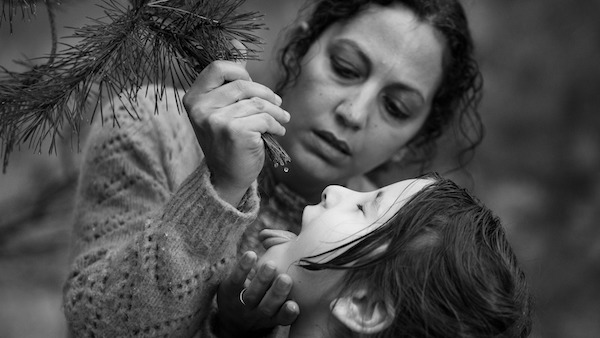Film Review: “Green Border” — Zone of Disinterest
By Peter Keough
Green Border is artful, anguished agitprop.
Green Border. Directed by Agnieszka Holland. Opens at the Coolidge Corner Theatre on July 26.

A scene from Green Border.
Director Agnieszka Holland’s harrowing, tendentious Green Border opens auspiciously enough with a diverse group of passengers on an airliner on their way to Minsk. They are refugees from Syria, Afghanistan, Africa, and other traumatized places who have been invited by the Belarusian dictator Alexander Lukashenko to use his country as an entry point into the European Union. They are relieved because they have been spared the other perilous routes to the hoped-for-safety of the West. “This route through Belarus is a gift from God,” says Amina (Dalia Naous), who, as Holland reveals in one of the film’s effective uses of exposition via dialogue, is fleeing the horrors of the Syrian Civil War with her family. “Otherwise I would never have come with the children.”
But they have been deceived. The invitation was a ruse, a cruel, cynical ploy by Lukashenko and his ally Putin to undermine the West by creating a crisis on the border. They are political pawns and will be treated as such — by both sides.
Upon landing, Amina and her family join Leila (Behi Djanati Atai), an Afghan woman traveling alone, and take a minibus to the border with Poland and from there to a hopefully rosy future. The illusion is shattered when they are stopped at a roadblock where the guards, in collusion apparently with the van driver, shake them down for money. Luckily Leila has cash and can speak English, the (sometimes) common language, and when they are brutally driven through the barbed wire and told to run into the forest she has access to GPS and can tell them the good news — they are in Poland!
And so they are, but this is just the beginning of a Sisyphean game in which they are rounded up and roughed up by the Polish border guards and then driven back to Belarus where the even more sadistic Belarusians load them onto trucks and shove them over the border again. Holland captures these exchanges in black-and-white, cinema-verite-like scenes unnervingly similar to those in her Holocaust-set films Angry Harvest (1985), Europa, Europa (1990), and In Darkness (2011). Her obvious point: despite the promises of a united Europe, respect for human rights today has sunk to a level not seen since the darkest days of fascism.
But there are decent people who try to make a difference, or at least feel guilty about not making a well-intentioned effort. In addition to focusing on the plight of the close-knit, extended family of refugees, Holland also shares the points of view of some of those who live in the area and feel compelled to confront the obvious injustice.
There is Jan (Tomasz Włosok), a member of the Polish border guards who has been taken in by his government’s propaganda depicting the refugees as a fifth column of terrorists, pedophiles, and “zoophiles” (he’s especially amenable to these lies because some of “the tourists,” as they call them, have tried to take shelter in the house he is rehabbing). But he starts to have doubts about his duties when he witnesses pregnant women tossed over razor wire fences and stumbles across the corpse of an old woman who has frozen to death. When his wife spots him in a video taken by human rights activists of his unit’s actions at the border, he has a crisis of conscience. But will he do anything about it?
Another is Julia (Maja Ostaszewska), a middle-aged psychologist who lives in the area and is struggling not to pay attention to what’s going on. In a telling scene she conducts a therapy session via Zoom in which her patient goes off on a tirade about how it’s the actions of the right-wing politicians running the country that are driving him crazy. But only she commits herself to doing the right thing when she tries to rescue refugees drowning in a swamp on her property.
In a poignant epilogue, Holland flashes forward to the Polish-Ukrainian border in February 2022 as the thousands of Ukrainian women, children, and old people fleeing the Russian invasion are welcomed without reservation. A soldier lovingly carries one of the children to safety. An aid worker takes the child from his hands and says, “Too bad you weren’t such a caring dad to those kids on the Belarusian border, you dick.” The soldier slinks away and responds, “I was never there.”
Peter Keough writes about film and other topics and has contributed to numerous publications. He had been the film editor of the Boston Phoenix from 1989 to its demise in 2013 and has edited three books on film, most recently For Kids of All Ages: The National Society of Film Critics on Children’s Movies (Rowman & Littlefield, 2019).
Tagged: Agnieszka Holland, Europe, Green Border, Russia, belarus, immigration
